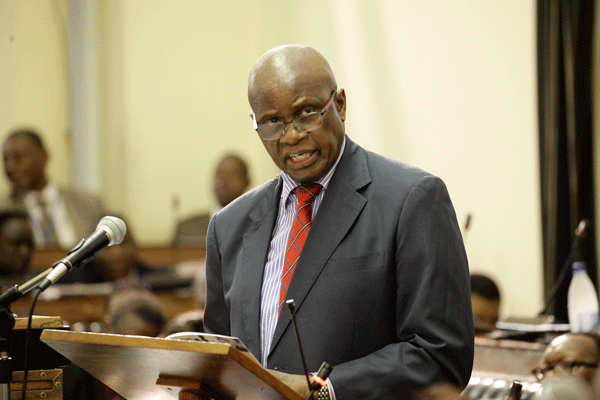
THE 2017 national budget is not pro-poor, with 73% of the vote going towards salaries, while an introduction of more taxes makes Zimbabwe the second highest taxed country in the sub-Saharan region, analysts have said.
BY VICTORIA MTOMBA

Last week, Finance minister Patrick Chinamasa unveiled a $4,1 billion budget under the theme, Pushing Production Frontiers Across all Sectors of the Economy.
Of that budget, $3 billion is earmarked for salaries, with current operations and capital projects taking $400 million and $520 million respectively. The budget projects a 1,7% growth rate steered by growth in agriculture and mining.
In an interview on Friday, Labour and Economic Development Research Institute of Zimbabwe senior economist Prosper Chitambara told Standardbusiness that the macroeconomic framework had not changed with recurrent expenditure dominating the budget.
“The budget cannot be pro-poor when 91% of it is going towards salaries and wages, 8,3% of the total budget is going towards defence, which is 3% of Gross Domestic Product (GDP). Health will get 6% of the budget, which is below the 15% threshold stipulated by the Abuja Declaration and translates to 2% of the GDP,” he said.
In the period January to October, employment costs were 91% of the total revenue.
Chitambara said the health levy that has been proposed on airtime should have been levied on cigarettes and alcohol as it would affect small businesses.
- Chamisa under fire over US$120K donation
- Mavhunga puts DeMbare into Chibuku quarterfinals
- Pension funds bet on Cabora Bassa oilfields
- Councils defy govt fire tender directive
Keep Reading
Chinamasa proposed a 5 cents levy on $1 airtime and data to finance the health fund.
“The levy has been proposed to help in the delivery system. in general, the sector is being supported by partners and government should ring fence resources to support the health delivery system,” Chitambara said.
He, however, said there were positive tax incentives, but said they would not be enough and the fact that Chinamasa did not say much on the proposed parastatal reforms was a challenge as well.
Chitambara said the country had a high tax burden, raising the need for a uniformed tax system that improved tax compliance.
“When you increase taxes, people will continue to evade taxes,” he said.
The 2017 national budget tax measures include presumptive tax that has been reviewed downwards from quarterly to monthly basis with effect from January 1 2017 and the removal of wheat flour, school uniforms and luggage ware, including bags and suitcases on the open general import licence start January 1 2017.
Speaking at a Confederation of Zimbabwe Industries breakfast meeting on Friday, Chinamasa said he was happy with the strides he had made in containing the wage bill, adding that it was a legacy issue.
“We had two ways: we have already started one i.e to cut things, cutting things is difficult; cutting salaries, cutting pensions and reviewing benefits, it’s not easy,” he said.
Chinamasa said a committee was set up that included him and the Public Service Commission to address concerns of overemployment, adding work was underway.
He said between 2019 and 2020, civil service wages and salaries should be at least 50% to 55% of the budget.
Buy Zimbabwe chief economist Kipson Gundani said there was no political will to address the wage bill, which was crowding out allocations to social services and capital expenditure.
“It’s a structural bottleneck of the budget statement and its clear, borrowing from developments after the mid-term budget statement that there is no political will to decisively deal with that,” he said.
He said government had not been doing much on parastatals’ reforms.
A local economist said the budget was pro-growth but required policy consistency, adding support to industry required complementary measures to address such things as availability of long-term financing and retooling.
“Government borrowing and a high wage bill will continue to choke capital formation while increased treasury bills will lower banks’ ability to support the private sector,” the economist said.
An analyst said the measure to tax 5% for every $1 airtime would make the cost of living high as every citizen would have to pay the tax and telecommunications companies would reduce the talking time.
“The minister should negotiate the collection of the tax debt of $2 billion and channel it towards the health sector,” the source said.
Government was owed $2,65 billion in unpaid taxes at the end of September 30, with companies struggling to meet their obligations.
The health sector received $281,9 million, with $223 million going towards remuneration and the remainder going towards operations and maintenance and capital expenditures.











